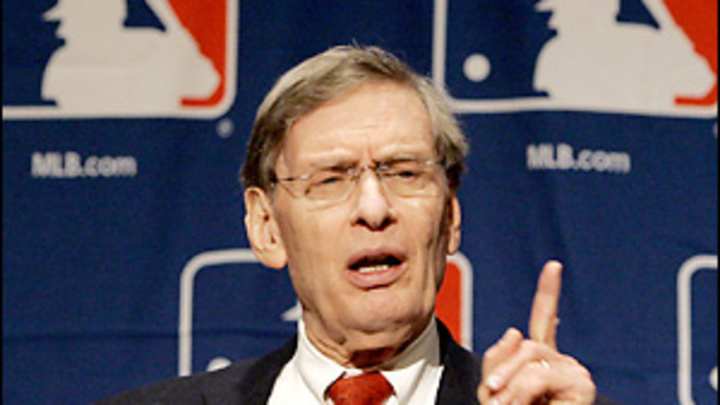Selig may not discipline 89 players


Andy Pettitte, Roger Clemens, Miguel Tejada and the vast majority of the 89 players mentioned in the Mitchell Report will not be suspended by Major League Baseball for their alleged steroid and HGH transgressions, and it remains possible that none of the 89 players will be banned, SI.com has learned.
Commissioner Bud Selig is not believed to be close to making a final determination on penalties, but MLB officers and the players' union have been working hard to follow Sen. George Mitchell's 19 other recommendations, and under those conditions Selig may be less likely than first believed to buck Mitchell's strongly worded recommendation not to impose penalties.
If there are suspensions, the penalties would follow the steroid policy in place at the time of the infraction, sources said. Since only a handful of the 89 alleged infractions occurred after MLB's steroid policy included suspensions (penalties for steroids started in 2004 and for HGH in 2005), only those few players -- and none among Pettitte, Clemens and Tejada -- would be exposed to a possible ban. From a reading of the report and given that more than 50 percent of the players mentioned are already retired, it appears that fewer than 10 players could be affected.
Meanwhile, Selig is still weighing the possibility of disciplining San Francisco Giants management for not following up on evidence Barry Bonds' trainer Greg Anderson was distributing performance-enhancing drugs in the clubhouse as early as 2002. So it's possible now that the Giants may be the only entity punished by MLB.
Reached by phone, Selig declined to comment.
Players union chief Don Fehr, speaking of possible penalties to the Fort Lauderdale Sun-Sentinel, recently said, "We have talked a lot about the fact that there ought not to be any. To that extent, we are treating this recommendation very seriously, and it would be odd and inappropriate if that was not taken into account."
Mitchell cited several reasons in the report for why he recommended that Selig refrain from imposing discipline on players except in extreme circumstances, including Mitchell's admission that there were surely numerous players who used performance enhancers but escaped his report. Mitchell also noted that most of the alleged violations occurred at point that is "distant in time," and worried that baseball could become needlessly bogged down by battles over potential bans.
"Spending more months or even years in contentious disciplinary proceedings will keep everyone mired in the past," Mitchell wrote.
Furthermore, Mitchell wrote, "The Commissioner should give the players the chance to make a fresh start, except where the conduct is so serious that he must act to protect the integrity of the game."
Clemens' alleged transgressions occurred from 1998-2001, while Pettitte's brush with HGH occurred in 2002, according to the report. (Though Pettitte has since admitted to another brush in 2004, that was a year before HGH was included in the policy.)
This winter Major League Baseball handed down 15-game bans to Orioles outfielder Jay Gibbons and Royals outfielder Jose Guillen for their involvement with banned substances through pharmaceutical sales. Their transgressions occurred during 2004, when second offenses resulted in 15-game bans. MLB didn't say anything at the time, but it's clear from the length of the suspensions that those transgressions had to be second offenses for both Gibbons and Guillen.
The Mitchell Report has stood up to scrutiny since its Dec. 13 release. The only three players from the report who have denied their alleged involvement have been Clemens, David Justice and Lenny Dykstra. Clemens' case has drawn the overwhelming majority of the attention, thanks to his big name and the vociferousness with which he has denied the allegation.
Clemens' case was recently taken up by the Justice Department after he took his denials into Congress.
